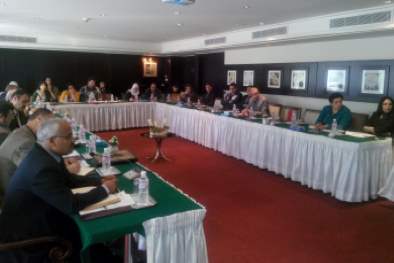More than 40 stakeholders took part in the National Consultation in Tunis, among which representatives from the Ministry for Agriculture, the Ministry for Infrastructure, Land Planning and Sustainable Development, the Ministry for Finance, the Ministry for Development and International Cooperation, the Ministry for Healthcare, the Ministry for Tourism, the Ministry for Industry, the water and sanitation services operators, universities and research centers, as well as independent experts, non-governmental organizations, civil society representatives, media and journalists.
Mounir Majdoub, Secretary of State responsible for Sustainable Development at the Ministry for Infrastructure, Land Planning and Sustainable Development, stressed that any action focusing on development - at local, national and global level - needs to respect the values of the fair resources’ distribution and the guarantee of the right to a decent human living. Therefore, the SDGs have to follow the call to responsibly act towards this direction. With regards to water, it is necessary to review both the production and demand management sides in parallel.
Khalil Bahri, Director General of Water Resources at the Ministry for Agriculture, highlighted the importance of the water sector in the development process, as well as the challenges that the sector faces, with water resources in Tunisia being limited and deteriorating – due to saline intrusion, dams siltation etc. - and water supply becoming progressively more expensive, while the water demand levels keep rising. The State is trying to promote water saving, via e.g. subsidizing by 60% water saving equipment, regular checking drinking water networks to avoid leaks and utilizing brackish water in the agricultural sector.
François Brikké, Senior Network Officer at the Global Water Partnership (GWP), underlined the value of partnerships for coordinated action leading to progress, as well as the consultation process leading to the definition of the SDGs and carrying the local communities’ voice to the international scene. He stressed the need to influence the political dialogue towards assuring that water will not be neglected in the development agenda of the future, given that it is at the heart of risks related to climate change adaptation, demand rise and pollution – all of them posing a global threat for public health and welfare, as well as the ecosystems’ integrity.
The National Consultation in Tunisia was held in the context of the intergovernmental process on Sustainable Development Goals (SDGs) established by the UN Commission on Sustainable Development, running throughout 2014, covering 10 further themes apart from water, and scheduled to be concluded by the General Assembly in 2015. Similar national consultations in 25 further countries will be facilitated by GWP. These national consultations aim to facilitate the discussion among stakeholders on the options and recommendations proposed by UN-Water with regards to a water-related SDG in the UN post 2015 agenda, as outlined in its relevant paper, prepared with GWP as partner. The results from the National Consultations will inform the official UN processes so that water is adequately reflected in the post-2015 agenda.
In Tunisia, the National Consultation focused on the water sector’s specific challenges and priorities for development action, as well as the indicators measuring the potential impact on them from a water specific SDG . The Consultation included three sessions:
- one putting the Tunisian Consultation into the wider context of the global SDGs consultation process and the proposed UN targets,
- one examining in groups each one of the five proposed targets[i] followed by a plenary,
- one discussing the necessary actions to achieve the objectives and the proposed targets within 15 years, along the mechanisms to monitor and evaluate the indicators to be established.
The National Consultation has concluded, among others, that water has a particular role to play and is at the epicenter of social and economic progress; it is actually the element that facilitates, to differing degrees, the achievement of every other sectorial SDG. Thus, it is not possible to treat water as a mere secondary parameter for achieving different sectorial SDGs. Particularly, for Tunisia, which figures among the pioneer countries by having included the human right to water and sanitation to its newly approved constitution, the inclusion of a water specific SDG in the UN post 2015 agenda would sustain and enhance efforts made at national level to assure this right for all and achieve water security by mobilizing the international community, including donors and International Financial Institutions (IFIs).
[i] The 5 targets are the following: a) guarantee universal access to safe drinking water, sanitation and hygiene facilities, b) improve by x % the sustainable use and development of water resources in all countries, c) all countries strengthen equitable, participatory and accountable water governance, d) reduce untreated wastewater by (x%), nutrient pollution by (y%) and increase wastewater reuse by (z%), e) reduce mortality by (x%) and economic loss by (y%) from natural and human induced water related disasters.
